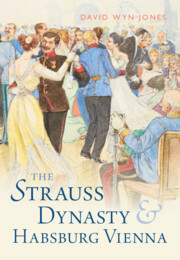2 results
3 - 1850–1870. Three Brothers: Johann, Josef and Eduard
-
- Book:
- The Strauss Dynasty and Habsburg Vienna
- Published online:
- 09 June 2023
- Print publication:
- 29 June 2023, pp 80-129
-
- Chapter
- Export citation

The Strauss Dynasty and Habsburg Vienna
-
- Published online:
- 09 June 2023
- Print publication:
- 29 June 2023

